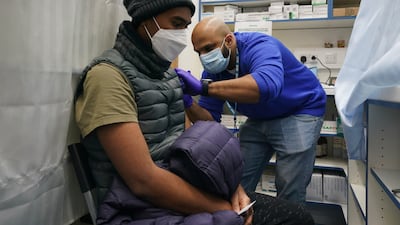Live updates: follow the latest news on Covid-19 variant Omicron
The AstraZeneca coronavirus vaccine could be protecting vulnerable people in the UK from deaths as the highly contagious Omicron mutation spreads rapidly, the former chief of the country's vaccine task force said.
Dr Clive Dix said early data showed the durable cellular immunity response produced by the shot could “last for life".
The vaccine, developed with the University of Oxford, was approved last December and vaccines were initially distributed among the older and the most vulnerable in society.
But fears over links to blood clots led some European countries to pause their use of the inoculation.
“We've seen early data that the Oxford jab produces a very durable cellular response and if you've got a durable cellular immunity response then they can last for a long time. It can last for life in some cases,” Dr Dix said.
In December, countries across Europe have been battling a new Covid-19 wave driven by the Omicron variant.
The UK has had a surge in daily cases to record levels but so far there has not been a similar increase in deaths.
Going into the holiday period, France and Germany and the Netherlands were imposing new Covid restrictions. Germany fears Omicron will become the dominant strain by mid-January.
“If you look across Europe, with the rise in cases, there's also a corresponding lagged rise in deaths but not in the UK, and we have to understand that,” Dr Dix said.
“I personally believe that's because most of our vulnerable people were given the AstraZeneca vaccine.”
AstraZeneca has been praised and criticised in the pandemic.
Its coronavirus vaccine was one of the first on the market and at a low cost compared to others.
The introduction of the Oxford-AstraZeneca shot in the UK led government advisers to recommend that under-40s should be offered alternatives after evidence that it may be linked to very rare blood clots.
In Europe, there was more widespread reaction to the clotting.















